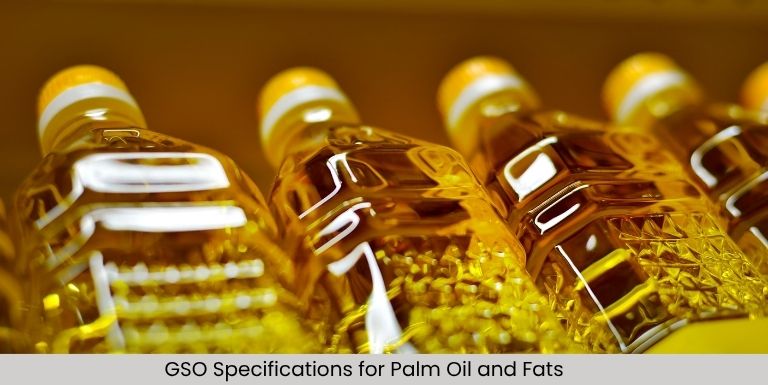Objective of the Article
The purpose of this article is to explain the legal, quality, and procedural framework that controls the import of RBD Palm Oil, Coconut Oil, and Vegetable Fats into the United Arab Emirates. It provides a detailed reference for exporters, importers, distributors, and conformity-assessment professionals seeking to comply with UAE food-grade oil regulations under the Emirates Authority for Standardization and Metrology (ESMA), the Ministry of Climate Change and Environment (MoCCAE), and Dubai Municipality Food Control. Readers will learn about mandatory standards, labeling rules, conformity testing, and import registration systems that ensure food safety and consumer protection in the UAE market.
Introduction
The United Arab Emirates has become one of the Middle East’s largest importers and re-exporters of edible oils and vegetable fats. With world-class ports such as Jebel Ali, Khorfakkan, and Abu Dhabi Khalifa, the country serves as a strategic hub connecting Asian producers of RBD Palm Oil and Coconut Oil with markets in the Gulf Cooperation Council (GCC), North Africa, and Europe.
As demand for refined oils continues to grow across food-processing industries, bakeries, confectionery units, and HORECA (hotel, restaurant, catering) sectors, compliance with UAE’s stringent import standards has become critical. These standards guarantee that imported edible oils are safe, authentic, properly labeled, and suitable for human consumption under local climatic and religious conditions.
Regulatory Framework for Edible Oils and Fats in the UAE
Three primary authorities oversee edible-oil imports:
- Emirates Authority for Standardization and Metrology (ESMA) – responsible for developing technical regulations, conformity marks (ECAS & EQM), and Halal certification.
- Ministry of Climate Change and Environment (MoCCAE) – manages food import permits, agricultural inspection, and environmental protection during transport and storage.
- Dubai Municipality Food Control Department – enforces municipal-level inspections, product registration, and market surveillance.
All imported edible oils, including RBD Palm Oil, RBD Coconut Oil, and Vegetable Shortenings or Fats, must comply with GCC Standardization Organization (GSO) specifications adopted by ESMA.

Key UAE and GSO Standards Applicable
GSO 9/2013 – Labelling of Prepackaged Foodstuffs
Defines the mandatory information on Arabic and English labels, including product name, net weight, batch code, nutritional data, manufacturing and expiry dates, and storage instructions.
GSO 1969/2011 – Fats and Oils: General Specifications
Specifies limits for free-fatty acids, peroxide value, moisture content, odor, color, and absence of adulteration in refined fats and oils.
GSO 2013/2003 – Palm Olein Specification
Covers RBD Palm Olein parameters such as iodine value (50–56 g I₂ / 100 g), melting point (19–24 °C), and maximum FFA (0.1 %).
GSO 323/2011 – Edible Coconut Oil Specification
Details purity requirements, lauric acid composition, and moisture limits for refined coconut oil.
GSO 1973/2011 – Trans Fatty Acids Limits in Food
Restricts industrial trans-fatty acids to ≤ 2 % of total fat content across all edible oil and fat products.
UAE Cabinet Decision No. 31 of 2020
Imposes packaging and labeling controls for food imports, aligning UAE practices with Codex Alimentarius and GCC food safety systems.
Labeling and Packaging Requirements of Edible Oils & Fats
Proper labeling is central to customs clearance and consumer confidence.
- Languages: Arabic and English are mandatory on all retail and bulk packages.
- Declarations: Type of oil (RBD Palm Olein, RBD Coconut Oil etc.), refined/hydrogenated status, and “non-hydrogenated” claim if applicable.
- Origin and Traceability: Country of manufacture, exporter name, production and expiry dates, and batch/lot code.
- Nutrition Panel: Energy value, fat composition (saturated, monounsaturated, polyunsaturated, trans fat).
- Allergen or Additive Statements: Required if flavoring agents or emulsifiers are used.
- Packaging Compliance: Containers must be food-grade, tamper-evident, and resistant to oxidation or leakage under high ambient temperatures common in the Gulf.
Incorrect labeling—particularly missing Arabic translation or wrong shelf-life dates—is one of the most frequent causes of shipment rejections at UAE ports.
Import Approval and Product Registration
Before import, every edible-oil product must be registered with UAE authorities through digital systems:
- ZAD Platform (MoCCAE) – Central system for food import and clearance approvals. Importers upload ingredient details, production process, certificates of analysis, and origin data.
- Montaji (Dubai Municipality) – Used for consumer product registration within Dubai. Once approved, the importer receives a product registration number mandatory for customs entry.
- ESMA Product Registration & ECAS Certification – Required for all edible oils marketed in the UAE. Products undergo conformity assessment against the applicable GSO standards.
- Halal Certification – If animal-based fats are included, certification from an ESMA-approved foreign Halal body must accompany the shipment.
Essential Documents for Import:
- Certificate of Analysis (CoA) showing FFA, PV, moisture, and iodine values
- Health Certificate from the exporting country’s authority
- Halal Certificate (if applicable)
- Bill of Lading, Commercial Invoice, and Packing List
- Certificate of Origin endorsed by the chamber of commerce
Quality Testing and Conformity Assessment
UAE ports employ advanced laboratories to test edible-oil consignments. Samples are drawn randomly from containers to ensure consistency with declared specifications.
Laboratory Tests Include:
- Free Fatty Acid Content (≤ 0.1 %)
- Peroxide Value (≤ 1 meq/kg)
- Moisture and Volatile Matter (≤ 0.1 %)
- Color and Odor – should be light and neutral
- Absence of Heavy Metals and Contaminants
- Trans Fatty Acids – below 2 % limit
Successful testing leads to issuance of ECAS (Emirates Conformity Assessment Scheme) certificates or, for high-performing brands, EQM (Emirates Quality Mark). Both signals compliance with UAE food-safety laws and allow product distribution within the Emirates.
Customs Procedures and Tariff Classification
UAE Customs and Ports Authorities classify edible oils under the Harmonized System (HS) as follows:
| Product | HS Code | Description |
| RBD Palm Oil / Olein | 1511.90 | Refined, bleached & deodorized palm olein for food use |
| RBD Coconut Oil | 1513.19 | Refined coconut oil for edible applications |
| Vegetable Shortening / Fats | 1517.90 | Blended vegetable fats or shortenings for food |
Import Duties: Usually 5 % CIF value for mainland importers. Goods entering Free Zones (JAFZA, HFZA, KIZAD) for re-export can qualify for duty exemption under UAE Customs Law No. (1) of 2002.
Documentation at Port Entry:
- Delivery Order from shipping line
- Customs Bill of Entry
- ZAD Approval and Product Registration number
- ECAS/EQM certificate
- Conformity report from ESMA-approved laboratory
Timely submission of documents accelerates port clearance and prevents demurrage charges.

Food Safety and Risk Management
Because of the UAE’s hot climate, maintaining oil quality throughout the logistics chain is critical.
Importers must adhere to temperature-controlled storage standards to prevent rancidity and oxidation. Warehouses should ensure good ventilation, limited light exposure, and stainless-steel or epoxy-lined storage tanks.
Traceability and Recall System:
Every importer is obligated to keep detailed records of batch numbers, production dates, and distribution destinations. In case of contamination or quality deviation, the Food Control Department can initiate a rapid recall through the ZAD database.
Transport Guidelines:
- Dedicated tankers or containers for edible oils only
- Sealed valves and pipes to prevent cross-contamination
- Compliance with MoCCAE’s Food Transport Regulations (2021)
Failure to maintain these conditions can lead to confiscation or re-export orders.
Halal and Religious Compliance
In the UAE, all food items must comply with Halal standards as per UAE.S 2055-1:2015 (Halal Food Requirements).
For RBD Palm Oil and Coconut Oil, Halal compliance focuses mainly on contamination-free processing, while blended vegetable fats may require proof that no animal-based emulsifiers or dairy derivatives were used.
Key Requirements:
- Certification from an ESMA-recognized foreign Halal body
- Separate processing lines for Halal and non-Halal products
- Clear Halal logo on the package once approved
- Periodic audit by ESMA or its authorized partners
The Halal mark not only fulfills regulatory obligations but also enhances market acceptance across GCC countries.
Common Compliance Challenges
Despite clear regulations, several importers and exporters face issues during clearance:
- Incomplete Labeling: Missing Arabic translation or nutrition table.
- Expired or Invalid Certificates: Old Halal or CoA documents.
- Non-Conforming Test Results: Higher FFA or PV than permitted.
- Packaging Non-Compliance: Use of non-food-grade plastic drums.
- Incorrect HS Classification: Delays due to wrong tariff codes.
To avoid delays and penalties, businesses should work with ESMA-approved testing labs and consultants for pre-shipment verification.
Practical Guidelines for Exporters and Distributors
- Pre-Test the Product: Ensure it meets GSO chemical and organoleptic limits before dispatch.
- Register Early: Start ZAD and ECAS registration at least 30 days before shipment.
- Design Compliant Labels: Arabic content, Halal mark, manufacturing and expiry dates in clear print.
- Use Food-Grade Packaging: HDPE drums, steel drums, or flexitanks suitable for temperatures up to 45 °C.
- Coordinate with Local Agents: Authorized importers registered with ESMA simplify customs processes.
- Maintain Traceability: Keep batch records, test reports, and shipping documents for audits.
Market Perspective
The UAE’s edible oil market is projected to grow steadily, driven by population increase and the country’s role as a re-export hub to Oman, Saudi Arabia, Kuwait, and Africa. Palm and coconut oils form the backbone of its food manufacturing sector, especially in snack and bakery applications.
As authorities continue to update regulations in line with global Codex standards, compliance will become even more important. Companies that invest in quality testing and traceable supply chains will gain faster clearance and stronger reputation in the GCC market.
Frequently Asked Questions
What are the main authorities regulating edible oil imports in the UAE?
ESMA, MoCCAE, and Dubai Municipality collectively govern registration, testing, and market surveillance.
Is Halal certification mandatory for RBD Palm Oil and Coconut Oil?
Yes, Halal compliance is required for all food products sold in the UAE, even if plant-based.
Which UAE standards set chemical limits for edible oils?
GSO 1969/2011 and GSO 2013/2003 specify FFA ≤ 0.1 %, PV ≤ 1 meq/kg, and moisture ≤ 0.1 %.
How is product registration done in Dubai?
Through the Montaji portal, managed by Dubai Municipality; a registration number is issued after review.
Can re-exported oils avoid import duty?
Yes, shipments handled through Free Zones like JAFZA can qualify for duty exemption if re-exported.
What happens if the shipment fails lab testing?
It can be re-exported or destroyed at the importer’s expense and may lead to temporary suspension of import permit.
How long is an ECAS certificate valid?
Generally one year, subject to renewal after factory audit and product re-testing.
Are hydrogenated fats allowed in the UAE?
Only if they comply with the trans-fat limit of ≤ 2 %. Otherwise, entry is prohibited.
What are the most common rejection reasons?
Incorrect labeling, expired certificates, and chemical values exceeding GSO limits.
Conclusion
The UAE maintains one of the most comprehensive regulatory systems for edible oils and fats in the region. Compliance with ESMA, MoCCAE, and Dubai Municipality standards is non-negotiable for the successful import of Vegetable Fats, RBD Palm Oil and RBD Coconut Oil.
By understanding the national standards (GSO codes), labeling requirements, and Halal obligations, exporters can avoid delays and build long-term relationships with UAE buyers. Proper testing, accurate documentation, and partnership with registered local agents remain the cornerstones of a smooth and profitable trade experience in the Emirates.
Author Bio

Sales Manager
Muhammad Usman, Sales Manager at Usha Edible Oil, combines years of industry experience with a strong focus on customer relationships. His expertise ensures that Usha Edible Oil delivers high-quality products, including RBD Palm Oil (CP6, CP8 and CP10), RBD Coconut Oil, Specialty Fats, Vegetable Shortening, Vegetable Ghee, and Margarine, to meet the diverse needs of global markets.
With a commitment to excellence, Muhammad continues to lead Usha Edible Oil in providing innovative and reliable vegetable oils, specialty fats, vegetable shortening, vegetable ghee, margarine export to various countries worldwide including Saudi Arabia, United Arab Emirates (UAE), Egypt, Syria, Qatar, Kuwait, Oman, Bahrain, Yemen, Iraq, Iran, Jordan, Lebanon, Palestine, Turkey, Sudan, solidifying its position as a trusted manufacturer, exporter, and wholesale supplier in the food industry.


